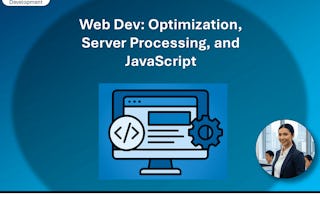Do you want to learn how to optimize your websites for search engines? This course will teach you how Search Engine Optimization (SEO) techniques can help improve the visibility of your website.

Intermediate Web and Front-End Development

Intermediate Web and Front-End Development
This course is part of IBM Front-End Developer Professional Certificate



Instructors: IBM Skills Network Team
Access provided by Coursera Learning Team
8,105 already enrolled
37 reviews
Recommended experience
What you'll learn
Define CMS and SEO, identify their types, and list their features and benefits.
Describe Webpack 5 and list its advantages, functions, and significance.
Define Mocha and Jasmine’s testing frameworks and compare and contrast their advantages and disadvantages.
Describe the debugging process, explain its importance, and identify various debugging methods.
Skills you'll gain
Details to know

Add to your LinkedIn profile
See how employees at top companies are mastering in-demand skills

Build your Mobile and Web Development expertise
- Learn new concepts from industry experts
- Gain a foundational understanding of a subject or tool
- Develop job-relevant skills with hands-on projects
- Earn a shareable career certificate from IBM

There are 5 modules in this course
After creating a website, web developers should use search engine optimization (SEO) techniques to help their website rank higher in search results, making it more visible to people online. SEO tools provide business owners with information about the overall health and success of their websites. They can optimize their website with an SEO strategy that combines layered on-page, off-page, and technical SEO tactics. You can improve a website's ranking and visibility by optimizing various front-end and back-end components such as page speed, keyword density, and external backlinks; this is known as page optimization for SEO, also known as on-page SEO. You can also use an SEO campaign as a well-planned effort to improve the ranking of a website in search results. This includes optimizing pages for specific keywords, creating high-quality content, constructing backlinks, and promoting the site on social media.
What's included
7 videos3 readings2 assignments1 app item1 plugin
Automated build tools and bundlers are a complete game changer in web development. For example, Webpack 5 is a module bundler that assists in handling the bundling of assets, modules, and dependencies into a single bundle while allowing developers to concentrate on the development. The automation process helps to standardize builds, speed them up, and minimize mistakes done manually. Instead of being dependent on online solutions, you can use Webpack 5 to build custom solutions or boilerplates. It allows you to create codes in modules. The initial configuration starts from a single module. It then processes all its dependencies, which can be either direct or indirect. The Webpack configuration further helps to determine whether code should be compressed for quicker execution or packed with source maps for better error tracking. In the production mode, Webpack tries its best to optimize the build by automatically minifying the code. The best production practices can be implemented to improve a website’s performance. Furthermore, you can use different Webpack tools to reduce the bundle size and use it with frontend frameworks for building and deploying web applications. Finally, by implementing the best practices for optimizing Webpack, you can ensure that your applications are optimized and function efficiently.
What's included
8 videos2 readings2 assignments1 app item
In today's fast-paced world, keeping load and response times to a minimum is critical because the longer it takes a website to respond, the more users will leave. This course teaches how web optimization measures and perceives the user experience of load time and runtime. You can identify tools, APIs, and best practices for measuring and improving web performance. You will discover how JavaScript can create highly interactive websites that engage users. On the other hand, increased engagement comes at a performance cost that can negatively impact website usability. To resolve this, you will learn how to use a testing framework for automated testing to increase testing speed and efficiency, improve test accuracy, and reduce test maintenance costs and risks. Mocha and Jasmine are two open-source testing frameworks you will learn about in this module. You will also learn how front-end testing involves creating a website's graphical user interface (GUI) so that users can view and interact with the website or web app.
What's included
6 videos1 reading2 assignments1 app item
Debugging is an essential part of the software development process. Bugs in software applications are typically caused by an unintentional or unexpected event and must be removed. As software may contain bugs even after meticulous planning and defensive programming, in this course, you will learn the various strategies that can be used to localize the error. You will discover how browsers now include a variety of add-ons or extensions that can be used for debugging and other web development tasks. You will learn how to use a debugging tool to debug a program without recompiling or changing its source code. You'll also know how Google Chrome DevTools allows developers to edit code directly in the browser, set breakpoints to detect problems, and debug code quickly. Finally, you will understand how website monitoring evaluates a website's functionality, performance, or availability and how monitoring tools perform routine tests and send notifications when a website is unavailable, making it easier to identify and resolve problems.
What's included
6 videos1 reading2 assignments1 app item
What's included
2 readings1 peer review2 app items1 plugin
Earn a career certificate
Add this credential to your LinkedIn profile, resume, or CV. Share it on social media and in your performance review.
Instructors


Offered by
Why people choose Coursera for their career

Felipe M.

Jennifer J.

Larry W.

Chaitanya A.
Learner reviews
- 5 stars
76.31%
- 4 stars
13.15%
- 3 stars
2.63%
- 2 stars
2.63%
- 1 star
5.26%
Showing 3 of 37
Reviewed on Sep 19, 2023
A great touch on advanced but soft and simple feel for business, UX, and CMS of a web or webapp.
Explore more from Computer Science
¹ Some assignments in this course are AI-graded. For these assignments, your data will be used in accordance with Coursera's Privacy Notice.





